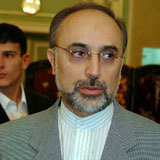Iranian Acting Foreign Minister Ali Akbar Salehi has said that building confidence is a precious asset in the area of diplomacy and foreign policy, MNA reported.
Salehi made the remarks at a ceremony held at the Foreign Ministry on Saturday in which he was officially introduced as the Islamic Republic's acting foreign minister. His predecessor, Manouchehr Mottaki, did not attend the ceremony.
In a decree issued on December 13, President Mahmoud Ahmadinejad dismissed Foreign Minister Manouchehr Mottaki from his post and appointed Atomic Energy Organization of Iran Director Ali Akbar Salehi as acting foreign minister. Ahmadinejad gave no explanation for the decision.
Salehi will serve as the acting foreign minister until parliament approves his appointment.
According to the Constitution, the president must submit his nominations for ministerial posts to parliament for approval.
Salehi, who is also currently one of the country's vice presidents, formerly served as Iran's permanent ambassador to the International Atomic Energy Agency.
He is fluent in English and Arabic and holds a Ph.D. from MIT. He was also the chancellor of Sharif University in the 1980s.
During his speech, Salehi highlighted the importance of "building confidence", saying, "This factor is a precious asset in the area of diplomacy and foreign policy."
In its foreign relations, the Islamic Republic should act in such a way so that the "principle of Islamic dignity" is not undermined, he said.
Through the adoption of a "positive and balanced foreign policy," the Islamic Republic should pave the way for its active participation in the international arena so that it will be able to help resolve regional and international disputes and disagreements, Salehi added.
The Tehran Declaration was an example of this policy, the acting foreign minister stated.
However, in this political challenge, the other side did not behave logically and they used the UN Security Council as a tool to divert attention from their illogical behavior, he observed.
On May 17, 2010, Iran, Turkey, and Brazil issued a declaration, according to which Iran was to ship 1200 kilograms of its low-enriched uranium to Turkey to be exchanged for 120 kilograms of 20 percent enriched nuclear fuel to power the Tehran research reactor, which produces radioisotopes for cancer treatment. According to the agreement, the exchange was to take place in Turkey under the supervision of the IAEA and Iran.
Commenting on the European Union's approach toward Iran, Salehi said, "Despite the Union's illogical, unprincipled, and unfair behavior, they seek stable relations with the Islamic Republic of Iran for many reasons, including the issue of energy."
"If the day comes when Turkey becomes a member of the European Union, the Islamic Republic of Iran" will be the largest Asian neighbor of the European Union, he noted.
Therefore, it would benefit both sides if the European Union abandoned its confrontational approach toward Iran, Salehi added.
Given the current situation in the region and the international arena, the promotion of relations with neighboring states and Islamic countries must be prioritized, he stated.
He added that the promotion of political cooperation with Saudi Arabia and Turkey is of special significance.
Commenting on Iran's relations with Saudi Arabia, Salehi said, "This country deserves to have a special political relationship with Iran. Iran and Saudi Arabia are two influential countries in the Muslim world and the region that can resolve many of the problems of the region and the Muslim world."
Turkey is also a country with a strategic location and "the expansion of relations with this state will benefit the Muslim world," he stated.
In addition, special political attention must be paid to China and Russia, he said.
However, this does not mean that relations with other countries, including Syria, Lebanon, Iraq, Pakistan, Afghanistan, and Azerbaijan, will be ignored, Salehi stated.
Elsewhere in his remarks, the acting foreign minister said that the sanctions imposed on Iran have had no effect on the country.
He also condemned Wednesday's terrorist attack in Chabahar, Sistan-Baluchistan Province.
"The terrorist attack in Chabahar brought to light the brutality of the so-called advocates of human rights," Salehi said.
On Wednesday, a suicide bomber detonated an explosive device outside a mosque in the southeastern city of Chabahar during a Shia religious ceremony, killing 35 people and injuring more than 100 others. Women and children were among the victims.
The terrorist group Jundullah claimed responsibility for the bombing, saying it was retaliation for the execution of the group's leader, Abdolmalek Rigi, in June.
Salehi also expressed appreciation for former foreign minister Manouchehr Mottaki's efforts and services.
In addition, he thanked President Ahmadinejad for his trust in him.






